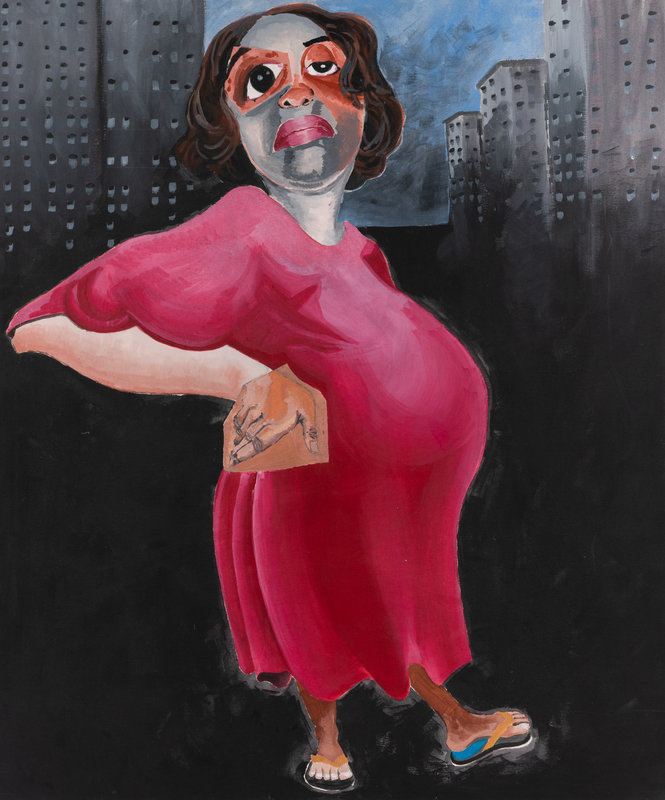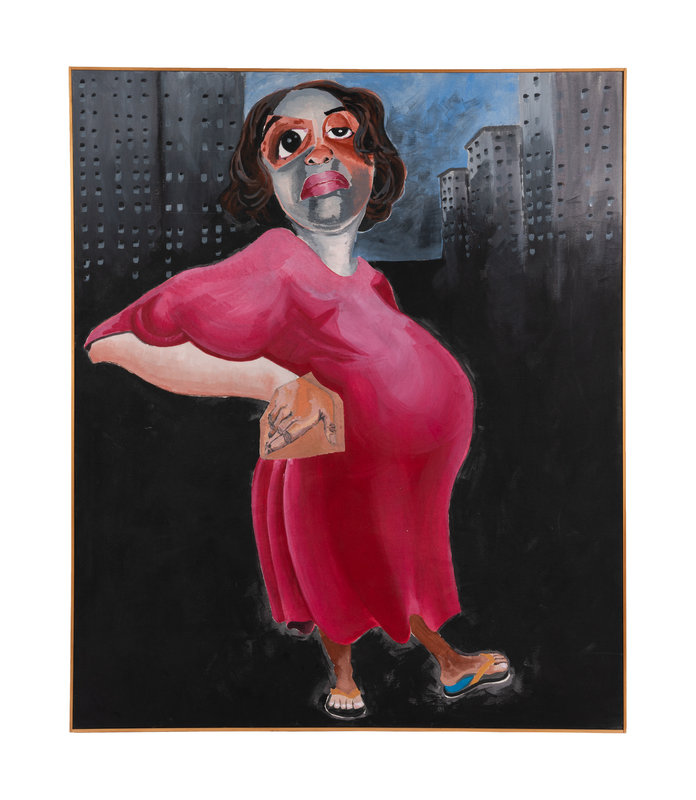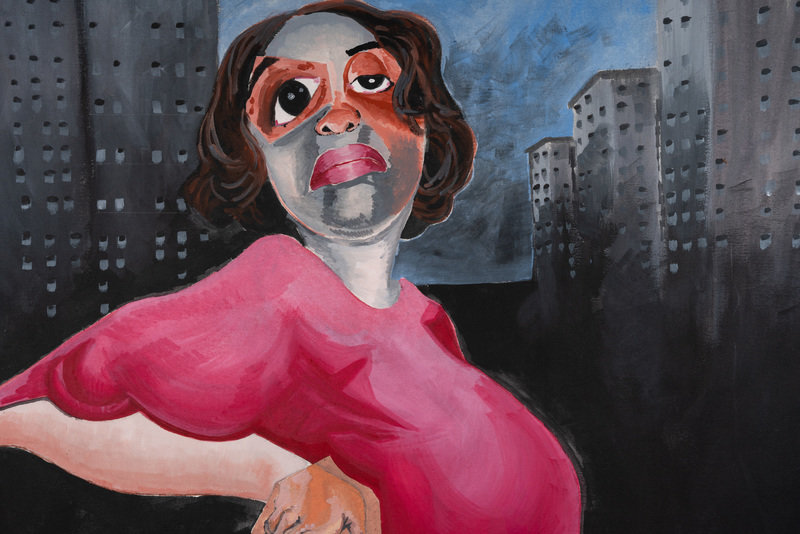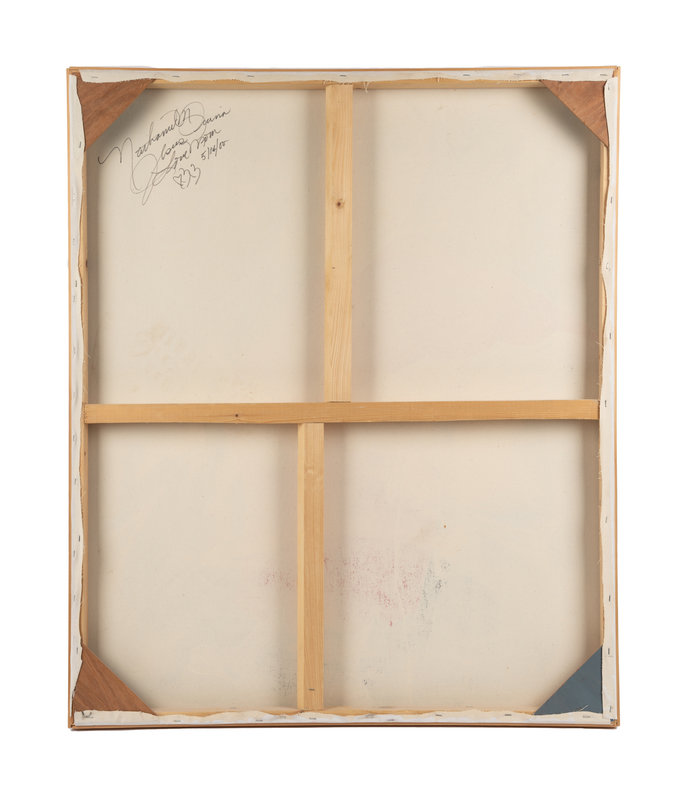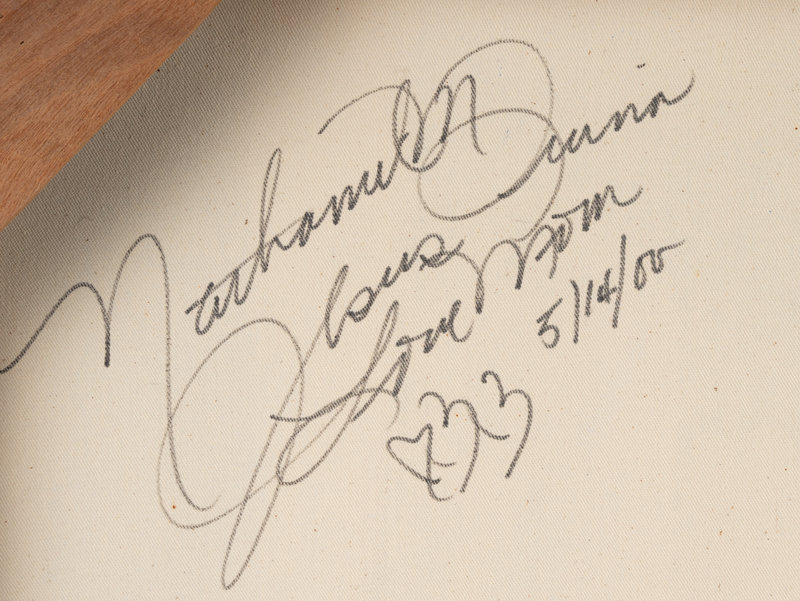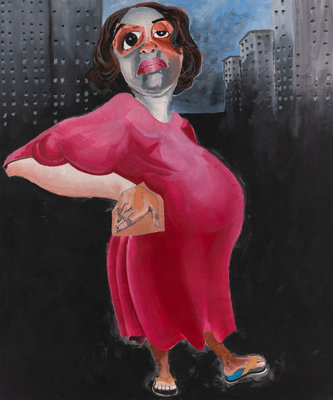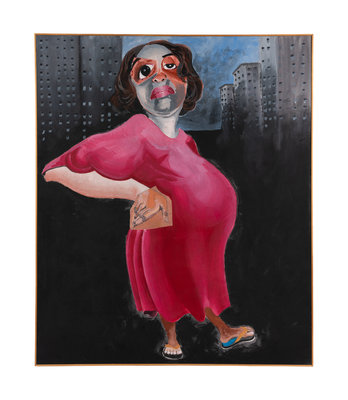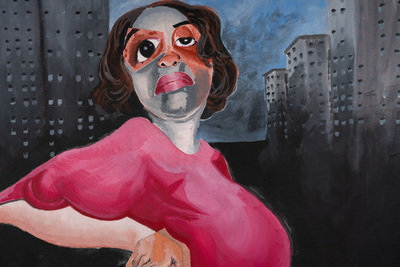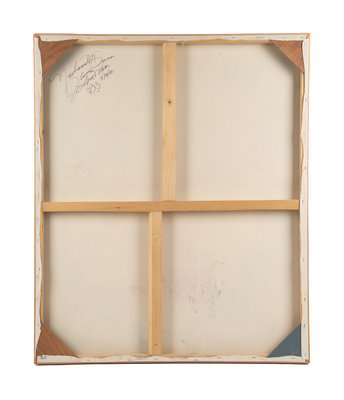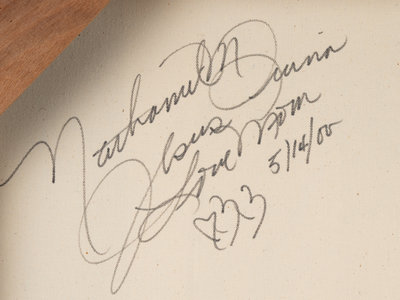Condition Report
Contact Information
Auction Specialist
Lot 51
Nathaniel Mary Quinn
(American, b. 1977)
Untitled (Portrait of the Artist’s Mother)
, 2000
Sale 1058 - Post-War & Contemporary Art
Sep 28, 2022
10:00AM CT
Live / Chicago
Own a similar item?
Estimate
$60,000 -
80,000
Price Realized
$75,000
Sold prices are inclusive of Buyer’s Premium
Lot Description
Nathaniel Mary Quinn
(American, b. 1977)
Untitled (Portrait of the Artist’s Mother)
, 2000oil on canvas
signed Nathaniel M Quinn, inscribed and dated (verso)
44 x 36 3/4 inches.
Property from a Private Chicago Collection
Exhibited:
Crawfordsville, Indiana, Wabash Fine Arts Center Eric Dean Gallery, Senior Art Exhibition, April - May, 2000
Lot Essay:
Mary: The Making of Nathaniel Mary Quinn
In Untitled (Portrait of the Artist’s Mother), Mary Quinn addresses the viewer. She takes up almost the entire painting, eyes gazing forward with her whole body presiding over the scene, including her right foot which points directly out. Parts of her body have a caricaturist element that is almost garish—a bright fuchsia dress over exaggeratedly large arms and stomach over stick-like legs and feet in flip flops. Her face and neck are rendered in shades of gray and white except for the crucial features of eyes, nose, lips, and hair painted in broad swathes of color, along with a carefully articulated hand, resting on her hip in expectation. The background of patchy buildings rising out of the all-black foreground emphasize a bleak and almost dystopian environment, in which Mary’s fuchsia is all the more striking.
This formidable work by Nathaniel Mary Quinn (American, b. 1977) is a fitting early portrait about memory and loss, featuring nascent characteristics of what would become Quinn’s signature style. Raised in the Robert Taylor Homes housing projects on Chicago’s South Side, Quinn’s desolating upbringing around drugs, poverty, and crime was tempered by the strength exhibited by his mother, Mary. According to Quinn, Mary “was literally around the building, helping people, feeding gangbangers and the drug users when they didn’t have anything to eat, letting guys help her with the groceries and paying them to help out.[i]” Working hard to pull himself out of his circumstances, he was awarded a scholarship at the prestigious Culver Military Academy in Indiana for high school where, freshman fall, he learned of his mother’s tragic sudden death. Quinn was dealt a second blow when, a few months later, upon coming home to Chicago for Thanksgiving, he found his apartment abandoned, with the rest of his family and material possessions gone—he has not seen them since. Finding the strength to continue, Quinn graduated from high school and attended Wabash College in Indiana, legally changing his name to Nathaniel Mary Quinn so that his mother’s name would appear on his diplomas, including his MFA from New York University in 2002.
Quinn has continued this memorial in his artistic practice, inscribing every work “Nathaniel Mary Quinn. Love. Mom. Jesus,” along with three hearts: “a heart for me, a heart for my mom, and a heart for God.”[ii] As said by Quinn, “Every painting I make is dedicated to the memory of my mother. And now everybody has to say her name.[iii] In addition to this inscription on the painting’s verso, Untitled (Portrait of the Artist’s Mother) also includes the date May 14, 2000, the same day Quinn graduated from college, and is the product of Quinn’s confrontation of his personal past—what would be a frequent future theme.[iv]
Quinn has continued this memorial in his artistic practice, inscribing every work “Nathaniel Mary Quinn. Love. Mom. Jesus,” along with three hearts: “a heart for me, a heart for my mom, and a heart for God.”[ii] As said by Quinn, “Every painting I make is dedicated to the memory of my mother. And now everybody has to say her name.[iii] In addition to this inscription on the painting’s verso, Untitled (Portrait of the Artist’s Mother) also includes the date May 14, 2000, the same day Quinn graduated from college, and is the product of Quinn’s confrontation of his personal past—what would be a frequent future theme.[iv]
For his senior studio course, Quinn was tasked with choosing a theme that would inspire “relentless hunger” throughout the project:
“I chose my family, and for the first time in eight years I finally had the chance to attack the emotional problems I had locked up inside of me—my mother’s death, my family’s departure, and my brother’s drug and alcohol use. I had never stopped to deal with those issues, and through my painting, I’ve been able to get them out in the open.”[v]
These works were exhibited as part of a Senior Art Exhibition from April to commencement on May 14th, 2000. Similar exploration of loss and memory is clear in Mary’s portrait.
The contrapposto of her body—emphasized by her jutting left elbow balancing her left foot shooting out in the opposite direction at the right—suggests a sense of movement—a woman seeking forward momentum. A bright blue patch of paint on her left flip flop ties the composition back to the blue of the sky, while also underscoring the sky blue’s drabness. But for all the personal dynamism suggested by her body, she has nowhere to go: her legs float over the black background, the area around her feet barely painted in with black and gray patches. Most arresting are the colorful swatches of Mary’s key features: eyes, nose, mouth, and hand. These features are so evocative of the nature of memories of lost loved ones. Memories linked to the five senses—hands touching, eyes seeing, the way they speak—sticking out while over time other details of memory fade to gray. But, for all the loveliness of the recollection, Quinn’s early painting avoids the trap of being saccharine through the caricatured elements and depressing setting. Mary is not an idealized proportioned woman in Arcadia, but rather stares out trapped in the smoky projects, her features exaggerated, hinting at the physical fragility that would later kill her even while her force of character is monumentalized.
In 2013, the artist made his breakthrough as, rushing to finish a series of paintings for an exhibition, he combined disparate drawn and painted images from his past, memories, and other media to create a collaged portrait of his brother, Charles.[vi] This painting paved the way to national and international attention. He became famous for these works of heavily collaged elements from various media, revolved around themes close to him, especially his past— first at an exhibition at the Museum of Contemporary African Diasporan Arts in Brooklyn and then onto future venues such as his 2021 Gagosian exhibition NOT FAR FROM HOME; STILL FAR AWAY. Though an early effort, Untitled (Portrait of the Artist’s Mother) illustrates a beginning engagement with the idea of how collage—here through the dissonance of black-and-white to colored elements in Mary’s face and hand—could be used to show the hazy nature of memories and loss amid terrible circumstance. Furthermore, the painting reflects a story of personal triumph for the artist. The exact day that he and Mary’s name appeared on his college diploma against all odds, Quinn remembers the woman who made it possible for him to get there, willing him on through her gaze.
Bibliography:
“Nathaniel Mary Quinn.” Gagosian. Accessed August 15th, 2022. https://gagosian.com/artists/nathaniel-mary-quinn/.
“Nathaniel Mary Quinn.” Interview by Anderson Cooper. Gagosian Quarterly (Fall 2019).
https://gagosian.com/quarterly/2019/09/04/interview-nathaniel-mary-quinn-anderson-cooper/.
“Wabash Events Calendar: May 14th, 2000.” Wabash College. Accessed August 15th, 2020. https://www.wabash.edu/calendar/day.cfm?vMonth=5&vYear=2000&vday=14&interest_id=0.
“Works in Progress: A Relentless Hunger.” Wabash Magazine (Winter/Spring 2000): 18-19.
[i] “Works in Progress: A Relentless Hunger,” Wabash Magazine (Winter/Spring 2000): 18.
[ii] “Nathaniel Mary Quinn,” interview by Anderson Cooper, Gagosian Quarterly (Fall 2019), https://gagosian.com/quarterly/2019/09/04/interview-nathaniel-mary-quinn-anderson-cooper/.
[iii] Ibid.
[iv] “Wabash Events Calendar: May 14th, 2000,” Wabash College, accessed August 15th, 2020, https://www.wabash.edu/calendar/day.cfm?vMonth=5&vYear=2000&vday=14&interest_id=0.
[v] “Works in Progress: A Relentless Hunger,” 19.
[vi] “Nathaniel Mary Quinn.” Gagosian, accessed August 15th, 2022, https://gagosian.com/artists/nathaniel-mary-quinn/.
